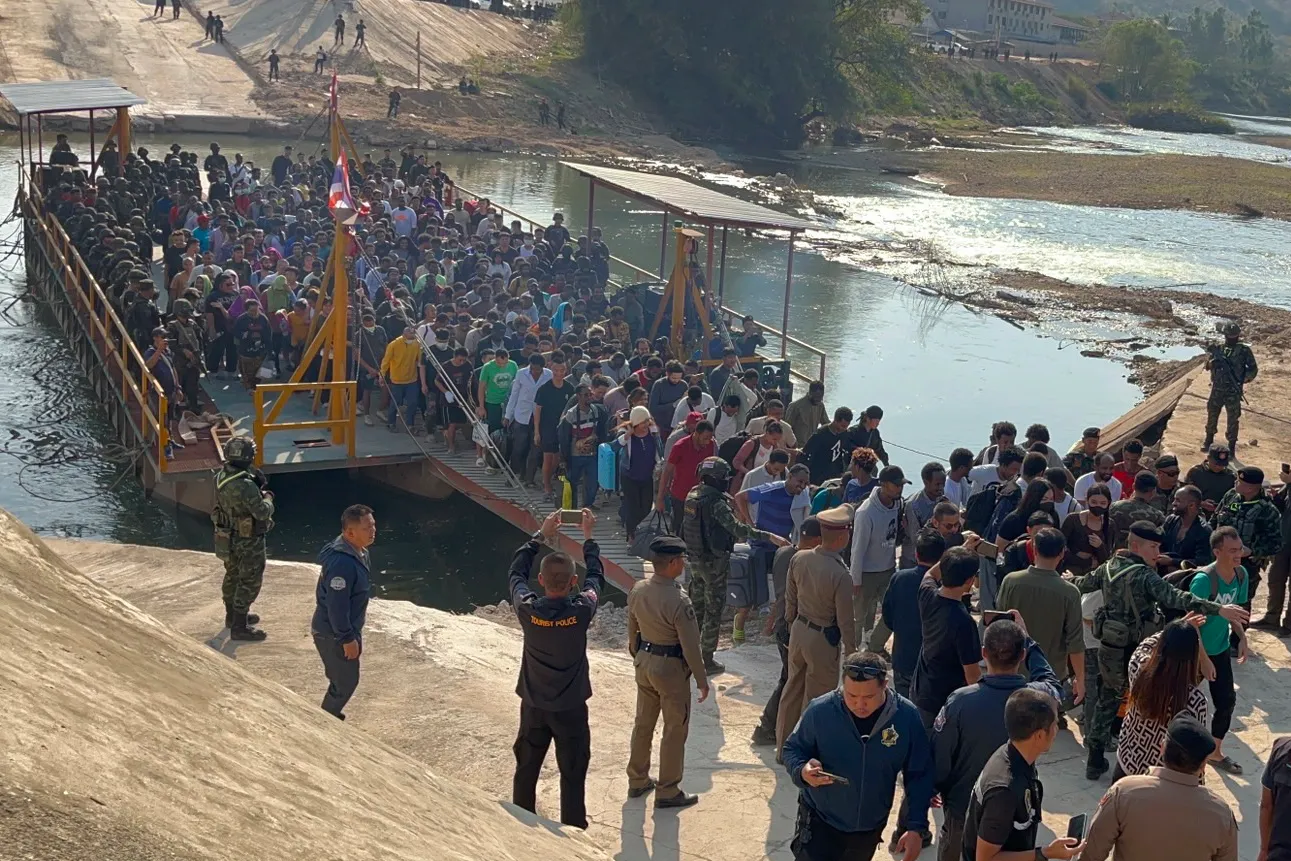
NGOCSTIP – In a significant operation, 260 human trafficking victims, including over half from Ethiopia, have been rescued from scam operations along the Myanmar-Thailand border. The operation took place just weeks after Thailand cut power to areas of the border to disrupt online fraud activities, also known as “scam centres.” The rescued individuals, who were found by a Myanmar rebel group, were handed over to Thai authorities for repatriation. This mass rescue highlights the ongoing issue of human trafficking tied to criminal online scams.
The Democratic Karen Buddhist Army (DKBD), a Myanmar insurgent group, rescued the victims. Officials found the group in the village of Kyauk Khet in Kayin state, Myanmar. The victims had been working in a scam centre operating across the border from Thailand. The DKBD, which has been actively searching for victims of forced labour, coordinated with Thai authorities for the safe return of these individuals. Thai officials confirmed that the group consisted of 260 people from 20 different countries, with 138 Ethiopians among them.
The rescue operation comes as part of a broader crackdown on human trafficking and scam centres in the region. Thailand has taken significant steps to combat these operations, including cutting off power and fuel supplies to areas known to be hubs for criminal syndicates running such fraud schemes. The crackdown follows previous reports that scammers trapped Taiwanese and Chinese victims in similar scam centres in Myanmar.
“Read about: PACTPAN Launches Effort to Raise Awareness on Human Trafficking”
The scam centres in Myanmar are part of a widespread network of human trafficking and online fraud operations in Southeast Asia. These compounds, often run by Chinese criminal syndicates, are notorious for luring people with promises of high-paying jobs. Once victims arrive, criminals force them into labor, including scamming other individuals online. Many survivors describe horrific conditions in these centers. The criminals hold them against their will and subject them to abusive treatment.
These scams deceive and exploit people through various online fraud schemes, such as fake job offers, phishing scams, and online gambling frauds. Once trapped in the system, many find escape nearly impossible. Criminals constantly watch and control them to prevent any chance of freedom.
The 260 individuals rescued by the DKBD were among the latest group of victims to be freed from these disturbing operations. The rescue effort is part of a growing international response to combat human trafficking and online fraud in the region. In recent months, numerous reports have highlighted the vulnerability of foreign nationals, particularly those from Taiwan, China, and Ethiopia, who have fallen prey to such fraudulent operations.
Thailand has been taking more assertive measures to address the growing problem of scam centres. In an effort to disrupt these illegal operations, Thai authorities recently implemented a policy to cut off electricity and fuel supplies to the Myanmar border areas suspected of hosting scam centres. This decision followed the rescue of several Chinese victims who had been held captive in Myanmar’s borderlands for months.
By depriving the scam centres of power, Thailand hopes to weaken their operations and prevent further abuse of foreign nationals. As a result, many of these scam centres have resorted to using generators to continue their fraudulent activities. The Thai government has also stepped up security along the border, increasing military checkpoints and issuing public warnings about the dangers of being deceived into working illegally online.
The repatriation of victims from Myanmar has become a high priority for Thai authorities. Many of the individuals rescued were sent to Thailand’s border areas to receive medical care and assistance before returning to their home countries. For some, the hope of returning home is the first step in rebuilding their lives after experiencing such trauma.
“Read more: Urgent Call for Blood Donations: Help Save Lives at the Norman Regional Blood Drive!”
The rescue of 260 victims is part of an international effort against online fraud and human trafficking in Southeast Asia. Recent reports show criminals abducting, trafficking, and forcing victims into fraud, sparking outrage and demands for stronger actions. Criminal syndicates play a major role in these operations, increasing concerns in many countries about widespread human exploitation.
Various governments and non-governmental organizations (NGOs) are working together to provide support for victims of human trafficking. These groups aim to provide victims with the necessary resources for recovery, including shelter, counseling, and legal assistance. Additionally, organizations and authorities are working to raise awareness about the dangers of online fraud and trafficking, particularly among vulnerable populations.
The Thai government has also been working closely with other Southeast Asian countries to combat the spread of these scam centres and prevent further victimization. Joint efforts between law enforcement agencies have been critical in identifying and dismantling these criminal networks.
Human trafficking and online fraud are rising concerns in Southeast Asia. Countries face pressure to stop these crimes quickly. Thailand, Taiwan, China, and Myanmar must take action. Governments need to protect citizens from further exploitation and trafficking. More victims escape and share their painful experiences. Their stories push the international community to act against these illegal operations. Authorities crack down on scam centres and strengthen border security. These steps help fight human trafficking but are not enough. Criminals continue exploiting vulnerable individuals across the region. Governments and organizations must do more to stop these syndicates. Stronger cooperation and stricter enforcement are necessary. Without serious action, many more people will become victims of these crimes. The suffering of those trapped in scam centres is alarming. Human trafficking remains a major crisis worldwide. Every country must commit to fighting these crimes. Protecting innocent people should always be a top priority.